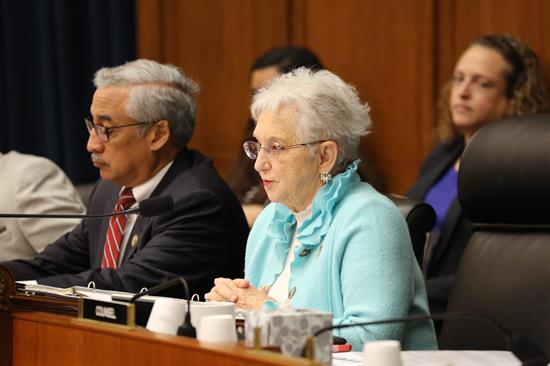Press Releases
Committee on Education and the Workforce Examines Evidence-Based Policymaking and Privacy for Students
WASHINGTON,
January 30, 2018
Today, the Committee on Education and the Workforce, chaired by Rep. Virginia Foxx (R-NC), held a hearing on “Protecting Privacy, Promoting Policy: Evidence-Based Policymaking and the Future of Education.”
“Education research can be a powerful tool to help our students, but that information should not come at the cost of a student’s private and personal information,” said Chairwoman Foxx. “The changing nature of data use and technology for educational purposes, the use of evidence and research in policymaking, and the public’s consistent call for privacy protections over student data are why we are here today.” “Currently, two primary laws govern use of education research and student data privacy protections. The Education Sciences Reform Act (ESRA), in addition to other things, authorizes the Department of Education’s research arm,” Foxx noted. “The second is the Family Educational Rights and Privacy Act (FERPA) that protects student privacy by establishing parents’ and students’ rights to access their student records and limits who else can see those records.” Members of the committee heard from prominent researchers, privacy advocates, and other stakeholders about how education data can provide a strong foundation for evidence-based programs while continuing to safeguard student confidentiality, and how they believe federal laws are achieving these goals. Dr. Neal Finkelstein, a Senior Program Director at WestEd, an education research, development, and service agency in San Francisco, California spoke extensively about how education research can be applied to produce favorable results. “Over the past 15 years, the Institute of Education Sciences (IES) has made significant strides promoting and increasing the amount of rigorous evidence available to education decision makers,” said Dr. Finkelstein. “Not only have education researchers applied methods from these fields to questions in education and social science, but we are now conducting studies with greater precision and speed than ever before,” Dr. Finkelstein added. Jane Robbins, a Senior Fellow at the American Principles Project Foundation, acknowledged that data is a useful tool to examine the strength of policies, but cautioned the need to truly protect student privacy when collecting data, especially the data of minors. “Research is important and to be encouraged (at least when it’s not of the biased type frequently funded by the federal government to produce evidence in support of a pre-ordained outcome). But in a free society governed by consent, no identifiable citizen data held by the government should be made available to any researcher without the consent of the data owner – that is, the citizen from whom it was taken,” said Robbins. In terms of pre-K-12 data, Robbins noted that “this principle is even more important because the research subjects are children who can’t give informed consent.” A former member of the Commission on Evidence-Based Policymaking, Dr. Paul Ohm of Georgetown University Law Center, endorsed both Dr. Finkelstein’s praise of the use of education data, and Ms. Robbins’ concerns in regards to protecting student privacy. “If there is one consistent theme in my research, it is the proposition that data analysis and privacy invasion are two sides of the same coin. The very same mechanisms that let researchers use data to learn useful information about people and programs can also, in the wrong hands, lead to serious and harmful invasions of privacy,” Dr. Ohm said. “I think we should find a balance between these competing interests,” he added. “When policymakers can see the methods and results, then we have a better understanding of what works and what doesn’t work for policymaking decisions in the future,” said Chairwoman Foxx. The Committee will continue to explore how evidence-based policymaking can foster better educational programs, while ensuring the protection of student privacy. # # # |
Browse News
Stay Connected

